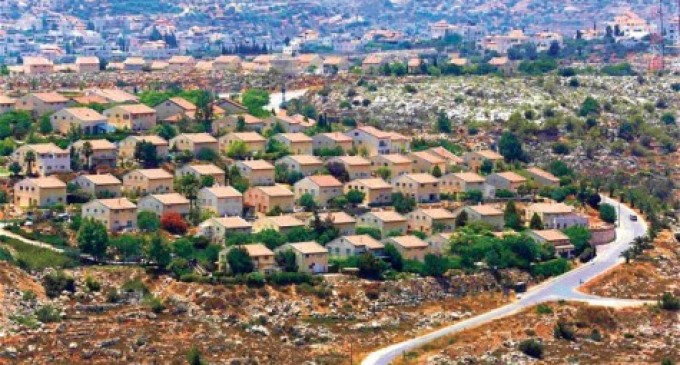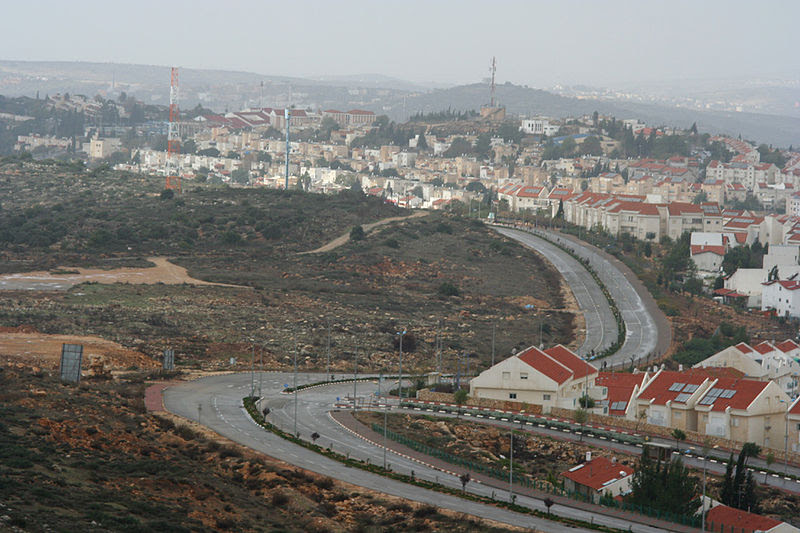
Reclame van de Leumi-bank op de luchthaven van Tel Aviv: ‘Where ever you want to go, Leumi is with you.’ Oók in de illegale nederzettingen.Yehudit Garinkol / PikiWiki

Schermafbeelding van het ‘Verslag Duurzaam en verantwoord beleggen 2016’ van het ABP. Op pagina 32 beschrijft het fonds zijn beleid ten aanzien van de mensenrechten.
CORRESPONDENTIE MET HET VERANTWOORDINGSORGAAN
ABP, DAT TOEZEGDE, MIJN OPROEP AAN ABP TE BESPREKEN
MET HET ABP BESTUUR
|
”
- Stop providing services in or to settlements, including financing construction projects, providing mortgage loans and loans to local authorities, and operating bank branches and ATMs in settlements. Refrain from opening new branches in settlements and take the necessary steps to close existing branches.” [5]
”
”
| Tot slot |
| ABP zal de komende tijd de bedrijven waarin we via aandelen of obligaties kunnen beleggen (dit zijn ca. 10.000 bedrijven) beoordelen aan de hand van hogere eisen, ook als het gaat om mensenrechten. Velen willen dat de invoering van dit beleid sneller gaat en het kan on ook niet snel genoeg gaan. Het is echter een lang en intensief proces dat zorgvuldig moet worden doorlopen. Mensenrechten zullen bij het insluitingsbeleid ook een grote rol spelen.
Mevrouw Beuken, een vraag: Tsja, ik weet natuurlijk niet precies, WAT uw bedrijf onder CITAAT 5 Ik citeer als laatste ” Ons duurzaam en verantwoord beleggingsbeleid is om die reden gebaseerd op twee objectieve uitgangspunten, te weten internationale wet- en regelgeving en de uitgangspunten van de UN Global Compact. En daar houden we ons aan. ” U houdt zich dus aan de uitgangspunten van Un Global Compact? Principle 2: make sure that they are not complicit in human rights abuses. [7] Het lijkt niet vergezocht, als ik beweer, dat u hierin al zwaar in overtreding bent. Hoe durft u mij dan wijs te maken, dat u zich op de uitgangspunten van UN Global Compact baseert? Trouwens, ik heb interessant nieuws voor u: Die nederzettingenbanken, met wie u zo vrolijk zaken doet, hebben volgens de Human Rights Watch rapportage ook al de gelederen van UN Global Compact versterkt [8], terwijl ze in alle opzichten in strijd met de doelstellingen handelen. CONCLUSIE Mooie beginselverklaringen en het veroordelen van de misdadige Israelische bezetting en nederzettingenpolitiek zullen u niet helpen, want deze bestaan niet los van uw misdadige activiteiten! Uw investeren in Israelische banken, die direct verweven zijn met de illegale Israelische nederzettingen, die staan voor land, waterdiefstal en terreur jegens de bezette Palestijnen, maken u medeplichtig aan een misdadig bezettingsregime, welke schoonkllinkende woorden u ook in uw brieven en verklaringen mag gebruiken. Nogmaals: U bent misdadig bezig! Wilt u ECHT opkomen voor mensenrechten, zoals u steeds beweert en niet doet: STOP DAN PER DIRECT MET ALLE INVESTERINGEN IN DIE DRIE ISRAELISCHE NEDERZETTINGENBANKEN! Alleen dan toont u, dat mensenrechten voor u meer zijn dan loze letters op papier. HANDEL! NU! De enige reactie, die ik nog van u wens te ontvangen is: ”Mevrouw Essed”, wij hebben onze investeringen in de drie Israelische nederzettingenbanken gestopt en zullen ook in de toekomst geen zaken meer doen met ondernemingen met belangen in de nederzettingen. Dan is het tijd voor een compliment aan uw adres. Tot dan verdient en krijgt u slechts mijn diepe minachting. Vriendelijke groeten Astrid Essed Amsterdam
NOTEN
[1]
” Op peildatum 31 mei 2018 had het fonds nog altijd 76 miljoen euro belegd in drie Israëlische banken: Bank Leumi (56 miljoen), Bank Hapoalim (19) en Discount Bank (1).”
THE RIGHTS FORUM
ABP BLIJFT BELEGGEN IN ILLEGALE ISRAELISCHE KOLONISERING
5 JUNI 2018
[2]
THE RIGHTS FORUM ABP BLIJFT BELEGGEN IN ILLEGALE ISRAELISCHE KOLONISERING
5 JUNI 2018
[3]
AMNESTY INTERNATIONAL USA TROUBLED WATERS: PALESTINIANS DENIED FAIR ACCESS TO WATER WATER IS A HUMAN RIGHT AMNESTY INTERNATIONAL BELGIE HOE ISRAEL DE PALESTIJNSE WATERKRAAN DICHTDRAAIT
[4]
” Israëlische banken zijn vérgaand betrokken bij de illegale kolonisering van de bezette Palestijnse Westelijke Jordaanoever – en bij de rechtenschendingen waarmee die gepaard gaat. Dat blijkt uit onderzoek van Human Rights Watch.”
THE RIGHTS FORUM
ISRAELISCHE BANKEN FUNGEREN ALS
MOTOR VAN ILLEGALE KOLONISERING
30 MEI 2018
HUMAN RIGHTS WATCH
BANKROLLING ABUSE
ISRAELI BANKS IN WEST BANK SETTLEMENTS
29 MAY 2018
[5]
” RecommendationsTo Israeli Banks
To the Government of Israel
HUMAN RIGHTS WATCH
BANKROLLING ABUSE
ISRAELI BANKS IN WEST BANK SETTLEMENTS
29 MAY 2018
[6]
YETNEWS
130 ISRAELI COMPANIES, 60 INT’L CORPORATIONS ON
UN BLACKLIST
TEKST
UN High Commissioner for Human Rights al-Hussein warns Israeli firms of their inclusion in ‘blacklist’ of companies operating in West Bank, east J’lem, Jordan Valley; list includes prominent companies such as Bezeq, Hot, Ahava, Cellcom, Bank Hapoalim and others; Bezeq CEO scorns ‘entirely anti-Israeli propaganda.’
In the past few weeks, 130 Israeli companies and 60 international corporations operating in Israel received warning letters from United Nations High Commissioner for Human Rights Zeid bin Ra’ad al-Hussein cautioning them of their impending inclusion in a “blacklist” of companies active beyond the Green Line in “violation of international law and UN resolutions.” Ynet has gained access to part of the list, which is set to be published in late December and cites 25 well-known Israeli companies. The companies operate in different sectors—some in food manufacturing, others in services, pharmaceuticals and even high-tech—but have one thing in common: they all operate in settlements, east Jerusalem and the Jordan Valley. Among the companies in the commissioner’s sights are Ahava, Dor Alon, Amisragas, Angel Bakeries, Arison Investments, Ashdar, Clal Industries, Café Café, Cellcom, Danya Cebus, Electra, HP, Hot, the Israel Aerospace Industries, Matrix Systems, Motorola, Nesher, Partner, Paz, Rami Levy, Remax, Housing & Construction (Shikun Binui), Shufersal, Sonol and Trima.
The above companies are joined by the 12 companies already published on Channel 2 News including Bank Hapoalim, Bank Leumi, Bezeq and Bezeq International, Coca Cola, Africa Israel, Teva, IDB, Egged, Mekorot, Netafim and Elbit Systems. The “Washington Post” published American companies will also be appearing on the list, including Caterpillar, Tripadvisor and Airbnb. Some of the companies to be included on the list are still considering their response, but others are already fighting back with the claim their inclusion on the list may cause them financial harm and tarnish their brand, and are therefore looking into filing suits against the Commissioner and the UN’s Human Rights Council that called for the list’s preparation in the first place. The companies claim the list’s creation was politically motivated and point to the fact that the commissioner constructed no such lists pertaining to other regions of conflict—such as the Crimean Peninsula and Western Sahara—as proof.
Both Israel and the US have been working behind the scenes in the past few weeks to prevent the list’s publication, but it appears it may be presented with a fait accompli. Despite the fact the list carries no operational or legal ramifications, the symbolic move nevertheless caused concern among the Ministry of Foreign Affairs officials due to the fact it may provide a serious boost to BDS efforts, deter foreign investors and convince foreign companies operating in Israel to reduce their operations. “It may cause large investment firms or pension funds carrying stocks of various Israeli companies to divest in them because they, in turn, operate in the settlements. It may lead to a snowball effect that will greatly harm the Israeli economy eventually,” said a senior Israeli official. The Ministry of Foreign Affairs estimates the Human Rights Commissioner received most of his information about the Israeli firms from Israeli non-profits operating in the settlements and investigating business activities beyond the Green Line.
AIPAC goes to war
In an effort to scuttle the move, the pro-Israel American Israel Public Affairs Committee (AIPAC) lobby has been working in the US on promoting rapid legislation in Congress determining any company divesting its business dealings from Israel will be considered to have “capitulated” to the Arab boycott, and would thus be in violation of American law. The Human Rights Council’s efforts to isolate Israel—executed through the office of the commissioner—have largely been facilitated by what Israel frequently slams as the UN body’s years-long anti-Israeli majority which has a long record of a bias slant. Bezeq CEO Stella Handler published a Facebook post 12 days ago in which she made public the overture she received from the UN’s Human Rights Commissioner. After the Ministry of Foreign Affairs contacted her, Handler took the post down.
“Here’s something the UN’s Human Rights Council doesn’t want you know: we’ve received a message from Special Assistant to UN High Commissioner for Human Rights Mohammad Ali Alnsour. Alnsour communicated to us that Bezeq was to be included on a list of Israeli companies operating in the West Bank. He asked us to keep that information confidential and to not publically comment on it,” Handler’s Facebook post said. “Before we get started, here’s some background about the UN’s Human Rights Council. Since it was founded in 2006, it published 68 decisions denouncingIsrael, making up 50 percent of the total resolutions pertaining to specific countries the council has made. Not North Korea, not Syria, not Sudan and not Yemen were afforded such attention,” the post continued.
“We will not be cooperating with a move that’s entirely anti-Israeli propaganda. Despite the council’s attempts to harm Israel by harming Bezeq, we give you our solemn commitment to keep focused on what we do best: providing all of Israel’s citizens with quality service, to provide our employees with a fair workplace and to manufacture profits for our shareholders. That is our role as Israel’s communications infrastructures company,” Handler concluded. [7]
THE TEN PRINCIPLES OF THE UN GLOBAL COMPACT
TEXT
Corporate sustainability starts with a company’s value system and a principles-based approach to doing business. This means operating in ways that, at a minimum, meet fundamental responsibilities in the areas of human rights, labour, environment and anti-corruption. Responsible businesses enact the same values and principles wherever they have a presence, and know that good practices in one area do not offset harm in another. By incorporating the Ten Principles of the UN Global Compact into strategies, policies and procedures, and establishing a culture of integrity, companies are not only upholding their basic responsibilities to people and planet, but also setting the stage for long-term success. The Ten Principles of the United Nations Global Compact are derived from: the Universal Declaration of Human Rights, the International Labour Organization’s Declaration on Fundamental Principles and Rights at Work, the Rio Declaration on Environment and Development, and the United Nations Convention Against Corruption. Human RightsPrinciple 1: Businesses should support and respect the protection of internationally proclaimed human rights; and Principle 2: make sure that they are not complicit in human rights abuses. LabourPrinciple 3: Businesses should uphold the freedom of association and the effective recognition of the right to collective bargaining; Principle 4: the elimination of all forms of forced and compulsory labour; Principle 5: the effective abolition of child labour; and Principle 6: the elimination of discrimination in respect of employment and occupation. EnvironmentPrinciple 7: Businesses should support a precautionary approach to environmental challenges; Principle 8: undertake initiatives to promote greater environmental responsibility; and Principle 9: encourage the development and diffusion of environmentally friendly technologies. Anti-CorruptionPrinciple 10: Businesses should work against corruption in all its forms, including extortion and bribery.
[8]
” Human Rights Watch wrote to seven Israeli banks about their human rights policies and procedures and contacted them about their operations in relation to the settlements. None of the seven Israeli banks contacted responded to questions regarding any steps they have taken to implement the UNGPs. Human Rights Watch did not find publicly available documents relating to such implementation. Bank Hapoalim, Bank Leumi, Bank Discount, and Mizrahi Tefahot are members of the UN Global Compact, which includes a commitment to respect and support “internationally proclaimed human rights” and to avoid complicity in human rights abuses. Each bank publishes an annual corporate social responsibility report”
HUMAN RIGHTS WATCH
BANKROLLING ABUSE
ISRAELI BANKS IN WEST BANK SETTLEMENTS
29 MAY 2018
|


.jpg/800px-Arieal,_Shomron(Storms_04).jpg)


